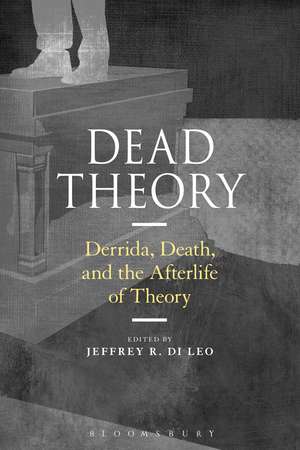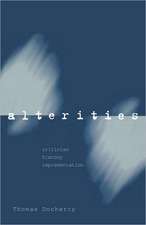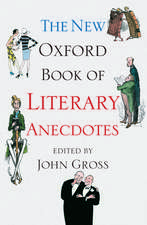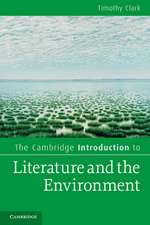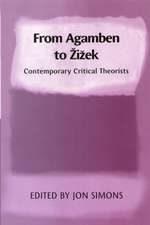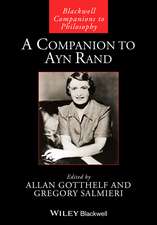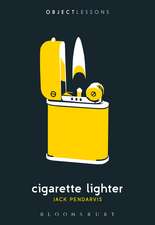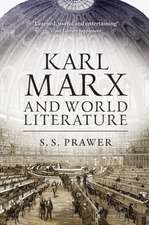Dead Theory: Derrida, Death, and the Afterlife of Theory
Editat de Professor Jeffrey R. Di Leoen Limba Engleză Hardback – 18 mai 2016
| Toate formatele și edițiile | Preț | Express |
|---|---|---|
| Paperback (1) | 236.90 lei 6-8 săpt. | |
| Bloomsbury Publishing – 29 noi 2017 | 236.90 lei 6-8 săpt. | |
| Hardback (1) | 713.29 lei 6-8 săpt. | |
| Bloomsbury Publishing – 18 mai 2016 | 713.29 lei 6-8 săpt. |
Preț: 713.29 lei
Preț vechi: 1028.22 lei
-31% Nou
Puncte Express: 1070
Preț estimativ în valută:
136.53€ • 143.16$ • 112.81£
136.53€ • 143.16$ • 112.81£
Carte tipărită la comandă
Livrare economică 29 ianuarie-12 februarie 25
Preluare comenzi: 021 569.72.76
Specificații
ISBN-13: 9781474274357
ISBN-10: 1474274358
Pagini: 256
Dimensiuni: 156 x 234 x 16 mm
Greutate: 0.53 kg
Editura: Bloomsbury Publishing
Colecția Bloomsbury Academic
Locul publicării:London, United Kingdom
ISBN-10: 1474274358
Pagini: 256
Dimensiuni: 156 x 234 x 16 mm
Greutate: 0.53 kg
Editura: Bloomsbury Publishing
Colecția Bloomsbury Academic
Locul publicării:London, United Kingdom
Caracteristici
Chapters written leading US scholars, including Jean Michel Rabate, W. Lawrence Hogue and Henry Sussman
Notă biografică
Jeffrey R. Di Leo is Professor of English and Philosophy and Dean of the School of Arts and Sciences at the University of Houston-Victoria, USA. Formerly President of the Society for Comparative Literature and the Arts, he is Editor of the American Book Review and Founding Editor of the journal Symploke. His previous publications include Criticism After Critique: Aesthetics and the Political (2014) and Turning the Page: Book Culture in the Digital Age (2014).
Cuprins
Acknowledgements Introduction: Notes from Underground: Theory, Theorists, and Death (Jeffrey R. Di Leo, University of Houston-Victoria, USA)Part I: Theory, Theorists, Death1. The Heirs to Jacques Derrida and Deconstruction (W. Lawrence Hogue, John and Rebecca Moores Professor, University of Houston, USA)2. The Humanists Strike Back: An Episode from the Cold War on Theory (Herman Rapaport, Reynolds Professor of English, Wake Forest University, USA) 3. The Afterlife of Critics (Henry Sussman, Visiting Professor of Gemanic Language and Literature, Yale University, USA)Part II: Derrida, Death, Theory4. Thanatographies of the Future: Freud, Derrida, Kant (Jean-Michel Rabaté, Professor of English and Comparative Literature, University of Pennsylvania, USA) 5. Ghosts in the Politics of Friendship (Paul Allen Miller, Professor of Classics and Comparative Literature, University of South Carolina, USA) 6. Death, Survival and Translation (Brian O'Keeffe, Lecturer, Barnard College, USA) 7. Theory's Autoimmunity (Zahi Zalloua, Associate Professor of Foreign Languages and Literatures, Whitman College, USA)Part III: Politics, Death, Theory8. Eclipse of the Gaze: Nancy, Community and the Death of the Other (Kir Kuiken, Associate Professor, University at Albany, State University of New York, USA) 9. Deleuze, Kerouac, Fascism, and Death (Hassan Melehy, Professor of French, University of North Carolina at Chapel Hill, USA) 10. Theory's Ruins (Nicole Simek, Assistant Professor, Whitman College, USA) 11. Undying Theory: Levinas, Place, and the Technology of Posthumousness (Christian Moraru, Professor of American Literature and Critical Theory, University of North Carolina Greensboro, USA)Index
Recenzii
Beginning from the position that 21st-century academic fields focus on "studies" as opposed to the 20th-century theory movement, Di Leo (English and philosophy, Univ. of Houston, Victoria) has gathered an array of scholars to counter reports of the death of theory and to focus on how the deaths of the theorists may have altered understanding of the theories. The 11 contributions are divided into three parts. The first part (three essays) focuses on Jacques Derrida's legacy, as seen through those conceived as the heirs of his theory. The first essay in this section plots that legacy through a multiplicity of disciplines, looking at the ways in which those traditional disciplines become interdisciplinary through the theory; the remaining two essays chart, respectively, the so-called death of theory through the Cold War and the subsequent resurgence of theory. The four essays in part 2, "Derrida, Death, Theory," present Derrida's theoretical work on death, arguing for the ongoing importance of theory; the four essays in part 3, "Politics, Death, Theory," continue the discussion through politics to posthumanism. This engaging work features consistently clear writing by many top scholars. Summing Up: Recommended. Upper-division undergraduates and above.
Each essay crackles with fresh and compelling insights . This collection bears special significance because it manages to clarify the relationship between death and theory and provides depth and rich insight. It is a welcome breath of fresh air in these stifling times, for it challenges readers to assess today's state of theory in its relation to death.
Each essay crackles with fresh and compelling insights . This collection bears special significance because it manages to clarify the relationship between death and theory and provides depth and rich insight. It is a welcome breath of fresh air in these stifling times, for it challenges readers to assess today's state of theory in its relation to death.
